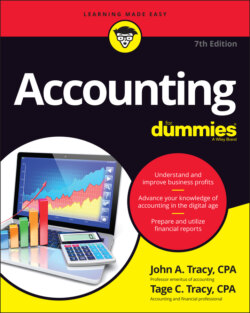Читать книгу Accounting For Dummies - John A. Tracy - Страница 59
Safeguarding Company Assets
ОглавлениеIN THIS CHAPTER
Distinguishing between bookkeeping and accounting
Getting to know the bookkeeping cycle
Making sure your bookkeeping and accounting systems are rock solid
Doing a double take on double-entry accounting
Protecting against innocent errors and cunning fraud
We think it’s safe to say that most folks are not enthusiastic bookkeepers. Let’s hope you reconcile or balance your checkbook against your bank statement every month (most likely electronically these days) and somehow manage to pull together all the records you need for your annual federal income tax return. But if you’re like us, you stuff your bills in a drawer or bury them in your cellphone somewhere, and just drag them out once a month when you pay them. And when’s the last time you prepared a detailed listing of all your assets and liabilities (even though a listing of assets is a good idea for fire insurance purposes)? Personal computer programs are available to make bookkeeping for individuals more organized, but you still have to enter lots of data into the program, and in our experience, most people don’t put forth the effort.
Individuals can get along quite well without much bookkeeping — but the exact opposite is true for a business. First of all, a business needs a good bookkeeping system simply to operate day to day. An army marches on its stomach. A business marches on data and information, without which it literally couldn’t make it through the day.
In addition to facilitating day-to-day operations, a company’s bookkeeping system serves as the source of information for preparing its periodic financial statements, tax returns, reports to managers, and a variety of other demands. The completeness, accuracy, reliability, and timeliness (the acronym CART that you see referenced time and again throughout this book) of these reports is critical to the business’s survival. If its accounting records are incomplete or inaccurate, its financial statements, tax returns, and management reports are incomplete or inaccurate. And inaccuracy simply won’t do. In fact, inaccurate and incomplete bookkeeping records could be construed as evidence of deliberate fraud (or at least of incompetence). Suppose, for instance, that the Internal Revenue Service decides to audit a business. The business won’t get very far with the excuse that it doesn’t have records to back up the deductions in its tax returns.
Obviously, then, business management has to be sure that their company’s bookkeeping and accounting system is dependable and up to snuff. This chapter shows you what bookkeepers and accountants do, mainly so you have a clear idea of what it takes to be sure that the information coming out of the accounting system is complete, accurate, reliable, and timely for all the demands on the system. We stress that strong internal accounting controls are absolutely necessary.
